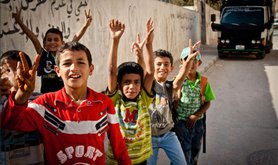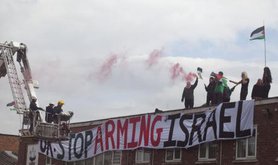
A Palestinian child being treated at the Shefaa Hospital. Credit: متجول/Wikimedia Commons. Some rights reserved.
Knowing how public I’ve been in support of the call for Boycott, Divestment, and Sanctions against the state of Israel, a Jewish colleague came up to me on campus one day to talk. “I know why I’m obsessed with Jews,” he said, “But why are you?” I could hear both puzzlement and pain in his voice.
It was clear at that moment that there were two kinds of “obsession” at work in his imagination. For him, a Jew should properly - perhaps obsessively - care about their fellow Jews. But my friend couldn’t help but wonder why I, as a non-Jew, would also “obsess so much” about his people, especially from a critical perspective.
My reply was pretty automatic: “I’m not obsessed with Jews,” I said, “I’m concerned about the Palestinians.”
I know and like this person a lot. In essence I don’t think his political position is much different to mine, except in terms of tactics. I think he trusts me too. But his statement revealed an important and discouraging assumption: one is naturally drawn to care about one’s own people, and it is unexpected - even odd - that someone from outside one’s group should care as much.
Taken in its most negative form, this attitude would conceive of an outsider’s interest as intrusive if it is not entirely positive. And that’s one of the main problems one faces when speaking of Israel and Palestine: not only does the line that’s drawn between groups seem hard and fast in terms of communication and ideology, but empathy and caring also seem to be contained within those lines as well.
Under such conditions, what are the possibilities that the conflict could ever be transformed?
According to the philosopher Richard Rorty, the transformation of human thought and feeling is not only possible, but natural: “We have come to see that the only lesson of either history or anthropology is our extraordinary malleability.” All people can change, Rorty is saying, especially when they open themselves up to new stories about others: stories that lead them to “tolerate, and even to cherish, powerless people - people whose appearance or habits or beliefs at first seemed an insult to our own moral identity, our sense of the limits of permissible human variation.”
This is not a new idea. Literature has long been considered the best vehicle for moral instruction exactly because it can take people out of their narrow sense of self and their self-centered habits of the mind. But what kind of stories would be most effective in this way?
In one of the worst current violations of human rights and international law - Israel’s bombing and land invasion of Gaza - the news is full of stories in the form of photographs, reports, and news clips of the tragedy. But it isn’t enough just to put them out there for the world to see. Although there are clear signs of a shift in attitudes toward the conflict, we need to go further than simply registering immediate impressions of who is good and who is not.
I believe that one of the main reasons why many people remain unchanged in their sympathies is that they are still too deeply rooted in the belief that certain people are worthy of their care, while others that fall outside their group are not only not worthy of the same care, but they are not even worthy of full recognition as human beings like themselves. As a result, the stories of people most like oneself are listened to with more openness and empathy than others. But in both cases, these stories are caricatures, simplifications. The actual, complex, stories of real people are ignored.
In the case of the Palestinians and Israelis, the dominant narratives describe the other entirely as ‘terrorists,’ or as the only aggressors in the conflict who deserve the rocket fire that’s raining down on them. To simply flip sides and say that now it is Israel or Hamas that is in the wrong, or in the right, doesn’t help much in the long run. We have to see a larger picture. We have to look more clearly at the actual political contexts of what is happening, and with that knowledge transform the ways in which we see people as blind agents whose identities are immutable. We need to see the real workings of history, culture, and politics in shaping human action. In the process, all those involved can be humanized.
While to be ethically consistent one must urge that both sides accept this imperative to resist stereotyping and its attendant racism, there is no question that until very recently, one side of the conflict has had its story largely obscured or erased from the historical record, and that is the story of the Palestinians. Ironically, it is precisely because of the Israeli invasion of Gaza that more and more people around the world are coming to know that history, and world opinion is shifting as a consequence. That is not only a political transformation, it is also a humanistic one.
The hope is that humanizing Palestine will allow others to see Palestinians as full human beings, and that, in turn, will transform the ways in which they are both perceived and treated. But again, such efforts at transformation must fight against entrenched habits of the heart and mind that confine people’s empathy to those who are most like themselves.
I admit that there’s a natural propensity to care for those with whom we have the most intimate relationships. But it’s all too easy to let that inclination confine our sense of responsibility within narrow limits. If we linger in that narrow circle, how is it that we would ever change? And if others remain locked in their own limited loyalties and commitments, how can they ever change themselves?
Change - especially in times of crisis - requires that we re-examine not only the stories we hear, but also why we care about them, and crucially, how we act as a result. This is not an abstract exercise. It’s critical in determining how we treat others. Change requires openness, but it also means unlearning our habits of caring. We must leave ourselves open to transformation even if that means going against our political biases. Without the capacity to respond to the historical moment, we not only abrogate our freedom to think and to act, we also make democracy into a hollow concept, an empty routine.
It’s terrible to think that only a massive human catastrophe and moral failing like Gaza could break through the habits of the mind and heart. But the ways in which the world has regarded the Palestinians - or rather has disdained and disregarded them – are finally, slowly, changing.
During the last mass bombing of Gaza in 2012, I argued the need for another narrative about the founding of the state of Israel. We have heard and deferred to the story of the Holocaust for so long that that the tragic story of the Jewish people has been allowed to blunt criticism of the means by which the Zionist state of Israel was created, and has been expanded illegally through the persistent growth of settlements in the Occupied Territories.
Today however, as the number of Palestinians killed in “Operation Protective Edge” rises above 1700, the vast majority of them innocent civilians (and mostly children), many people are responding to their plight in a different way. How was this allowed to happen, they are asking, and what roles have the United States and other powers played in bringing the catastrophe to pass?
A recent Gallup poll, for example, shows a slow but distinct generational change, at least in the USA, where more and more Americans, mostly younger, are willing to hear that other story. This is a point I make in a recent article in Salon: “there is now a widening band of light in between the heretofore seamless merger of the Holocaust and Founding narratives, resulting in a weakening of the former in its capacity to act as an alibi for the latter. This is especially important with regard to the US, which has been the world’s most generous supporter of Israel. Growing up well past the postwar era, increasing numbers of young people in the US find the Holocaust narrative to be less absolutely and unquestionably adequate as a rationale for supporting the horrible killings in Gaza. And as they learn more, their support will wane further.”
This is significant because only greater knowledge of our own responsibility for the catastrophe is likely to make us act in a different way - to end the killing and compel others to act with us. In this shift, the first thing to set aside is the habit of caring only for those who look, speak, act and think like us. Our “obsession” with those who are similar needs to be converted into a deep concern for those who are different, and who are easily ignored.
To do this means listening to their stories, and respecting them as rightful narrators of their own historical situation. While there are no guarantees, if we can expand our circle of care we can begin a process of transformation that will help us see a way out of the comfortable but narrow worlds in which we live.
Read more
Get our weekly email



Comments
We encourage anyone to comment, please consult the oD commenting guidelines if you have any questions.